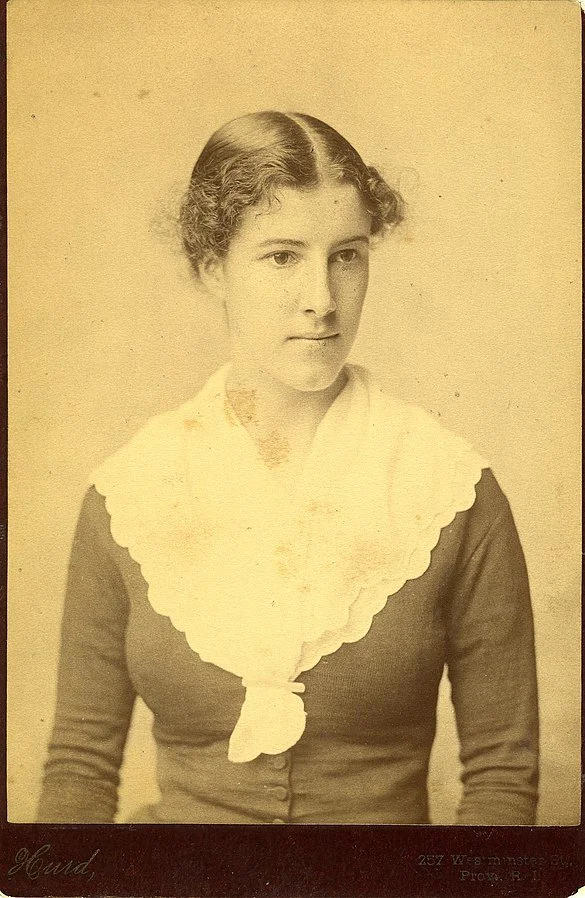‘Beyond the Yellow Wallpaper’ @ Echo Theatre
Photos by Zack Huggins/Graphics by Hadley Shipley
—Ramona Harper
Charlotte Perkins Gilman’s dark, semi-autobiographical short story “The Yellow Wallpaper,” first published in 1892, explores the female mind and mental illness, castigating the misdiagnoses and ill-treatment of women by the patriarchal medical community of the day. Echo Theatre beautifully expands its ongoing ‘Herstory’ series with Ann Timmons’ world premiere of Beyond the Yellow Wallpaper, a riveting dramatic narration on Gilman’s life and 19th century society’s oppressive constriction of women’s freedom. Gilman is quoted saying “I’ve got out at last…and you can’t put me back.”
By sheer force of will, Charlotte Perkins Stetson Gilman—a prolific writer, poet, and social critic—became a revolutionary voice for women’s rights. Toward the end of her life, she’s known to have asked, “Who will set the record straight after I’m gone?” Who better than playwright and actor Ann Timmons, who responded to the challenge with her one-woman Off-Broadway production Off the Wall: The Life and Works of Charlotte Perkins Gilman. The show toured nationally for 16 years.
Beyond is directed by Caroline Hamilton, a Dallas-based director and producer who also directed Ann Timmons’ 2021 suffragette celebration It’s My Party! at Echo. Timmons’ play is the second of the three plays in Echo Theatre’s 2024 season—led by artistic director Kateri Cale, who also performs a leading role in the play.
When a play that’s both a character study and a history lesson cleverly opens with a “once-upon-a-time” narration by the protagonist, we’re immediately taken back to story-time years that none of us ever completely outgrows. We’re drawn into the story, curious to hear what happens next, and filled with a keen desire to know how Gilman’s difficult but optimistic life will unfold as she emerges from a dark place, her post-partum depression after the birth of a daughter.
Veteran actor Constance Gold Parry is remarkable as Charlotte. She believably projects Gilman’s unstoppable determination to pursue both personal freedom and parity for other women in this unequal society. Her energetic optimism and purposeful creativity are her fuel.
Kateri Cale delivers a strong performance as Grace, a reassuring friend who supports Charlotte through the difficulties of her life, especially her inability to be a proper mother to Katherine (Mia M. Azuaje is Charlotte’s sensible but understandably disappointed daughter).
In supportive roles as Dora and as Gilman the young wife, Claire Fountain emotionally projects the shattering intensity of a woman presumed to be suffering from “hysteria,” a common, dismissive medical diagnosis often given to woman of that time.
Jared Culpepper plays several male roles, including Walter Stetson and George Houghton Gilman (Charlotte’s husbands) and a few more to round out the story line. Culpepper manages multiple roles with ease in a booming voice that naturally projects. However, he speaks several decibels above the women onstage, making us wonder if the loudness of his voice is organic—or an intentional way to let us feel the overbearing male domination of the 19th century.
The story line begins with Gilman’s “nervous depression” in the shadow of an unhappy marriage to Walter, her first husband, and ends at her death bed, where we witness the unsettling ending to a careworn but courageous life.
Costumes in a "period” show are a dramaturg’s delight. Designer Katelyn Jackson’s beautiful creations feature heavy fabrics and rich colors, with long, poufy skirts for the women, and mannerly, masculine vested suits and fedoras for the men. Nicole Iannaccone’s lighting design—in particular the shadowy silhouettes—plays an important part in expanding the number of characters we encounter.
Clare Floyd DeVries’ simple set of Charlotte’s bed, desk and chairs (with a wall projection of the “yellow wallpaper” in her prisonlike bedroom) represents the patriarchal society she yearns to escape—and eventually does.
Dramatic history is not always easy to present onstage without bordering on boredom. But Timmons’ imaginative take on the tradition-breaking life of Charlotte Perkins Gilman completely holds our attention with fast-paced timing, performances that superbly support the storyline, and themes that should deeply resonate with contemporary audiences.
Contentious culture wars about women’s reproductive rights and personal freedoms continue to confront women today, more than a century since Charlotte Perkins Gilman made her mark in feminist thought. Beyond the Yellow Wallpaper is sure to stimulate lingering conversations long after leaving the Bath House.
WHEN: May 9-25. 2024
WHERE: Bath House Cultural Center, 521 E. Lawther Drive, Dallas
WEB: echotheatre.org



